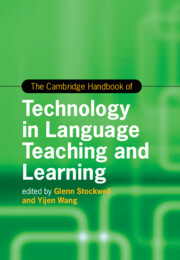Book contents
- The Cambridge Handbook of Technology in Language Teaching and Learning
- Cambridge Handbooks in Language and Linguistics
- The Cambridge Handbook of Technology in Language Teaching and Learning
- Copyright page
- Contents
- Figures
- Tables
- Contributors
- Abbreviations
- Part I Laying the Foundations
- Part II Environments
- Part III Tools
- 9 Mobile Devices
- 10 Teaching Languages with Games
- 11 Communication in Language MOOCs
- 12 Adaptive Instruction
- 13 Virtual Reality
- Part IV Social Aspects
- Part V Practice
- Part VI Language Skills and Areas
- Glossary
- Index
- References
10 - Teaching Languages with Games
from Part III - Tools
Published online by Cambridge University Press: 15 June 2025
- The Cambridge Handbook of Technology in Language Teaching and Learning
- Cambridge Handbooks in Language and Linguistics
- The Cambridge Handbook of Technology in Language Teaching and Learning
- Copyright page
- Contents
- Figures
- Tables
- Contributors
- Abbreviations
- Part I Laying the Foundations
- Part II Environments
- Part III Tools
- 9 Mobile Devices
- 10 Teaching Languages with Games
- 11 Communication in Language MOOCs
- 12 Adaptive Instruction
- 13 Virtual Reality
- Part IV Social Aspects
- Part V Practice
- Part VI Language Skills and Areas
- Glossary
- Index
- References
Summary
Educators have always harnessed the power of ludic activities for facilitating learning in low-tech teaching contexts, including for the teaching of foreign and second languages (L2s). Most current research on L2 learning with games has focused on informal (naturalistic) learning, has adopted a technology-centric perspective that prioritizes digital games which are ill-suited for most teaching contexts, and, particularly, has neglected the role of teachers. As teacher mediation is critical for enabling student learning, this chapter surveys work that shows how language teachers can leverage the opportunities inherent in games and play with a view to strengthening the naturalistic learning of their students. We spotlight the key role of the teacher in mediating learners’ language and literacy development, before, during, and after L2 activities through and around games. We also consider how the purposeful use of digital technology around games and play supports both learners and teachers in reaching their goals. We illustrate this through exemplary studies that are grounded in various pedagogies, and utilize both analogue and digital games that can be implemented in real classrooms. In doing so, we give equal importance to tools and technology (ludic materials), language learning goals, and pedagogical rigor.
Information
- Type
- Chapter
- Information
- Publisher: Cambridge University PressPrint publication year: 2025
References
References
Further Reading
This recent volume targets language teachers and features over eighty lesson plans based on games, the majority of which fall into the parlour or folk game categories rather than digital games. Therefore, like other teacher-oriented works published in the 1980s and before (see “historical perspectives”), this book is an excellent fit for teaching in low-tech contexts.
This short book addresses “language teaching professionals” – teachers, but also researchers and game designers. It offers strategies, scenarios, and other inspiration for implementing digital games in teaching contexts on the basis of theories of SLA and games, as well as pedagogy and game design.
This position paper on ludic language pedagogy explores the question of why teachers have been neglected in the literature on (digital) games for language learning, argues why teachers are needed, and demonstrates what teaching with games in real contexts looks like.
Accessibility standard: Unknown
Why this information is here
This section outlines the accessibility features of this content - including support for screen readers, full keyboard navigation and high-contrast display options. This may not be relevant for you.Accessibility Information
- 3
- Cited by
